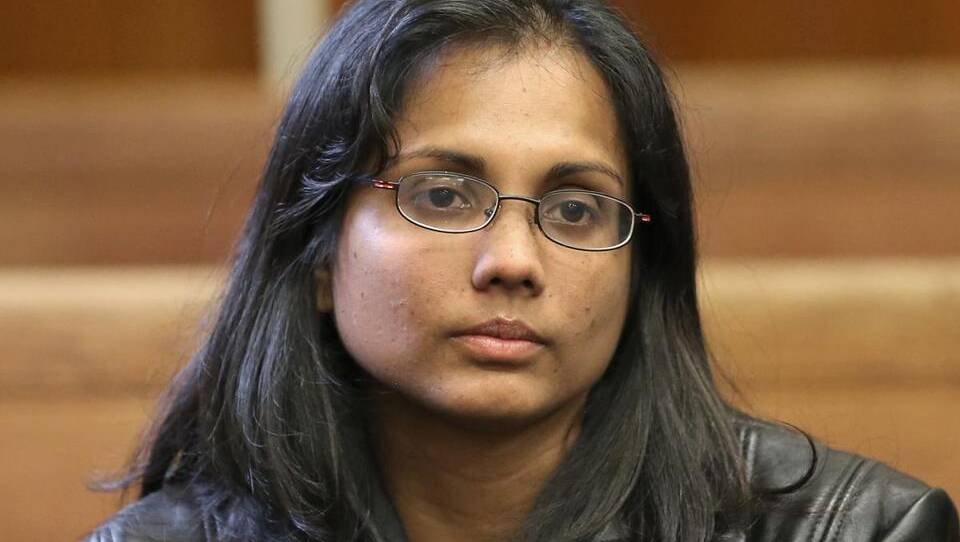More than 19,000 letters went out today to defendants whose drug charges were wiped away due to misconduct by disgraced forensic chemist Annie Dookhan. A few hundred more whose convictions will remain on the books will receive notices advising them of their legal rights.
Dookhan tested drug evidence for nearly a decade at the former Hinton laboratory in Jamaica Plain. She was arrested in 2012 for tampering with samples and falsifying reports. After three years in prison, Dookhan was released on parole in April 2016.
The Massachusetts top court ruled in January that the “extraordinary magnitude” of Dookhan’s impropriety required prosecutors to reexamine thousands of convictions. In April, seven district attorney offices agreed to permanently dismiss more than 21,000 cases tainted by Dookhan. Many of these were for misdemeanor drug possession or other charges in lower courts.
Prosecutors identified approximately 300 cases which they would not drop. District attorneys certified these cases could be successfully defended against appeal even without evidence handled by Dookhan.
The Supreme Judicial Court’s ruling required that all affected defendants be notified of their status.
“It is important for you, and for our system of justice, that you know about your rights if your case was one of those affected,” said SJC Chief Justice Ralph Gants in a video posted to the court’s website in late May.
Attorneys from the Committee for Public Counsel Services, the state’s public defender agency, and the American Civil Liberties Union of Massachusetts, which represented a handful of Dookhan defendants, met regularly with prosecutors for several months to determine logistics for delivering the notice letters.
“The notice planning process following the January 2017 SJC decision has been good,” said Matthew Segal, legal director of the ACLU of Massachusetts. “The court, the DAs, the ACLU and CPCS have all worked well together.”
Last fall, district attorney offices mailed their own letters to thousands of Dookhan defendants. But the SJC determined these notices were “wholly inadequate.” The envelopes had the appearance of junk mail, the letters failed to adequately explain recipients’ legal rights, and the Spanish versions were poorly translated, the court found.
Defendants with dismissed cases will receive a letter listing the precise charges and counts that are now vacated. Notices will be sent to each individual’s last known address by regular mail.
Those whose convictions have not been dropped will receive a longer packet with information about challenging Dookhan cases in court. These packets were sent by certified mail.
The Suffolk County District Attorney’s Office sent more than 100 of the second category of letters, including to one defendant still in custody on charges stemming from an armed robbery of oxycontin from a pharmacy.
All materials were sent in English and Spanish, with accompanying summaries in Portuguese, Haitian Creole, Vietnamese and other languages. The Committee for Public Counsel Services has created a hotline to answer questions about the letters or for those who believe they should have received a packet but did not. The CPCS hotline number is 1-888-999-2881.
The seven district attorney offices — Bristol, Essex, Cape and Islands, Middlesex, Norfolk, Plymouth and Suffolk — were responsible for all costs associated with sending the notices.
The court also ordered the district attorneys to pay $7,500 for a social media advertising campaign to reach those without a permanent address or whose addresses may have changed. The campaign launched last week in both Spanish and English on accounts managed by the ACLU of Massachusetts.
"The work continues — outreach is ongoing, notices to affected individuals went out today, and representatives throughout the court system and criminal justice system in our working group have worked very hard to make this happen," said Special Master Margot Botsford, who recently retired from the SJC but was appointed to oversee implementation of the court’s January ruling.
Shawn Musgrave can be reached at shawnmusgrave@gmail.com or on Twitter @shawnmusgrave. Reporting for this story was supported by the Fund for Investigative Journalism.




